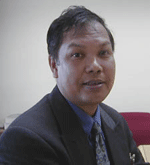Burmese lawyers suspicious of reforms
Published on Wed, 2012-07-25 14:42
Despite the political reforms that include the release of opposition leader Aung San Suu Kyi in 2010 and the multiparty by-elections last April, the Burma Lawyers’ Council (BLC, national focal point of Social Watch) warns there has been little substantive change so far. Doubts on the sincerity of the transition to democracy persist. “Make no mistake: we remain suspicious of the motives behind recent reforms and continue to criticize the process by which the current government took power,” said U Thein Oo, chairperson of the BLC, to journalist Kremena Krumova, of The Epoch Times. The BLC, organization that operates in exile out of Thailand, has condemned for years the imprisonment of political activists and the military’s abuse of the judicial system in Burma and was declared unlawful by the military junta in 2009. In a phone interview from Bangkok, Thein Oo reported to The Epoch Times that there are more than 30,000 lawyers working in Burma, yet they cannot practice their profession freely. “In Burma, lawyers are afraid for their daily life. Thousands have had their licenses revoked,” he said. Thein Oo explained that lawyers in Burma are treated as criminals by judicial authorities. For example, if a lawyer takes a case defending the rights of a farmer or a worker, the court might find his complaint offensive to the authorities, sue the lawyer, and take away his license. “Lawyers are treated as defendants if the court decides they have ‘challenged’ the court, or dared to ‘discuss’ the government. This is not a transition to democracy,” he added. Because of this, very few lawyers take cases involving civil rights, according to Thein Oo. Moreover, if a client knows that a lawyer had his license revoked at some time, they will not go to him again. This makes the situation of lawyers still worse. Last May, the Hong Kong-based Asian Human Rights Commission (AHRC) lauded the decision of Burma’s Parliament to allow lawyers who have lost their licenses or even spent time in jail for prior involvement in politics, to apply to get them back. “None of these lawyers violated any laws or rules to warrant the revocation of their licenses,” AHRC Executive Director Wong Kai Shing said in a statement. “Furthermore, government authorities themselves violated the rules by unilaterally revoking the licenses, and by failing to allow these lawyers to represent themselves in full and open inquiries into their alleged infractions,” he noted. For Thein Oo, the most important guarantee for sincere reforms in Burma is securing freedom of speech and freedom of association. For example, non-governmental organizations are still restricted in Burma, and there is no official organization to represent lawyers. “It is easy to see: If the NGO is pro-government, they grant registration. Otherwise, they tell you, ‘You are not acceptable.’ If they don’t want some kind of NGO, they just reject registration,” sayd Thein Oo. Though elected, Parliament still has little power because of the enshrined role of the military inside the powerful National Defense and Security Council (the military junta. The executive body “is keeping a close watch on political developments and may decide to step in to curb changes that threaten its power,” said the lawyer. Activists strongly criticize the constitution for enshrining the supremacy of the military and ensuring impunity for the army’s long record of human rights abuses. President Thein Sein, a former general, publicly claims to be willing to institute reforms, but Thein Oo does not see him as a reliable reformist. “He is not a good reformer, but a good performer,” the lawyer regretted. While significant changes are still lacking, the BLC is happy there are oppositionist National League for Democracy members inside Parliament, and activists outside Parliament, to drive reforms. Among the most problematic provisions in the current Constitution, the BLC mentioned the non-civilian control of the Armed Forces; the military control of the National Defence and Security Council (probably the most powerful non-elected body); and the fact that executive functions rest solely with the President, who lacks the power of the Commander-in-Chief. More information Source
|


